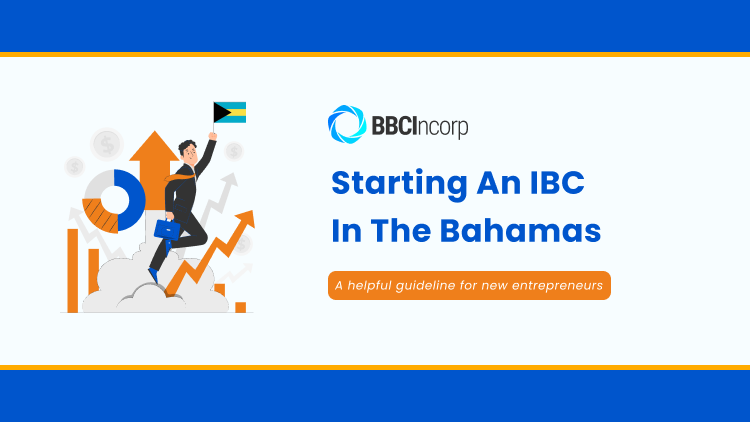
Table of Contents
If you’re considering starting an IBC in the Bahamas, look no further than this comprehensive guide. It provides all the necessary procedural information and more to assist you in the incorporation process.
The pros & cons of forming IBCs in the Bahamas
In this section, we’ll examine the top benefits and downsides of the Bahamas as an offshore jurisdiction.
Pros of incorporating as an IBC in the Bahamas
High business confidentiality
Incorporating as an IBC in the Bahamas offers a significant level of business confidentiality that protects shareholders. There is no requirement to maintain or publicly disclose personal information about shareholders without their consent. While the names of directors and officers are publicly available, as they must be filed with the Bahamas Registrar General’s Department, the use of nominee directors is permitted, allowing for additional privacy.
Shareholder meetings can be conducted via telephone or other electronic means, adding convenience for international stakeholders.
Furthermore, IBCs are not obligated to file annual returns or undergo third-party audits. However, financial records must be accessible to authorities if requested. While an annual fee based on the size of operations is required, this structure enhances the overall confidentiality and operational flexibility for business owners.
Stable government and economy
The Bahamas’ government and economic systems are rooted in a stable, English common-law foundation developed over decades since independence from the British Crown. This legal system brings reliability to the regulatory environment and has been the backbone of the nation’s sustained growth. Business legislation in the Bahamas is transparent and predictable, giving international investors a high level of security in legal matters and property rights.
The economy of the Bahamas is well-diversified, driven by tourism, financial services, and maritime industries. English is the primary language, which facilitates cross-border economy growth. Beyond tourism, the government has consistently leveraged revenue streams such as property taxes, customs duties, and stamp duties, each designed with tax mitigation policies that support a business-friendly climate.
Furthermore, this region is also part of international regulatory bodies and adheres to global standards. Its close economic relationship with the United States and other developed nations enables it to benefit from favorable trade policies, while its strategic geographic position supports the growth of financial services as well as international trade.
Favorable taxation
The Bahamas is highly attractive to investors primarily due to its corporate tax exemptions. According to the International Business Companies (IBC) Act of 2000, IBCs here are exempt from a variety of taxes, including:
- Capital gains tax
- Wealth tax
- Property tax reduction
- Gift tax
- Inheritance tax
- And so on.
Unlike many other low-tax jurisdictions, the Bahamas distinguishes itself from other low-tax jurisdictions by integrating these benefits with a sound economic framework.
Relaxed exchange control
Exchange control is regulated via fiscal policies that limit the number of foreign transactions going in and out of the country. These controls support the stability of the country’s external reserves and maintain the integrity of the Bahamian dollar, which is pegged to the U.S. dollar at a 1:1 ratio, making it a strong and reliable currency for foreign investors.
Notably, IBCs are exempt from these exchange controls, enabling them to move foreign funds freely, including repatriating profits and capital with minimal formalities. This operational flexibility benefits international businesses, facilitating seamless and unrestricted financial transactions across borders.
Cons of incorporating as an IBC in the Bahamas
Despite the various benefits, businesses should keep in mind that setting up an offshore business in the Bahamas is not without its challenges.
Significant potential for legislative changes
The Bahamas’ regulatory environment is subject to shifts that reflect both local policies and global financial standards. These changes often impact compliance requirements, tax obligations, and operating structures for International Business Companies (IBCs).
As this jurisdiction aligns with international frameworks to enhance tax transparency and deter activities like money laundering and terrorist financing (e.g. OECD and CFATF), foreign entrepreneurs should monitor these adjustments closely to ensure ongoing compliance and avoid unexpected disruptions to business operations.
Relatively high customs tariffs
The jurisdiction imposes the highest average duty rate in the Western Hemisphere. In particular, tariffs on some consumer goods run as high as 65% and reach 100% on imported items that compete directly with locally produced goods.
Value-added tax on both domestically produced and imported goods and services generates 45% of government revenue. While some tariff rates are as high as 60% (mattresses), many items that are considered necessary for the public good are duty-free (vitamins, deodorant, infant-related items).
A few categories are specifically high to provide a competitive advantage to local producers. This is the primary reason that the duty on boiled sweets, bleach, and water is 60%.
Non-tariff barriers
The government employs non-tariff barriers to trade including reserving investment in 15 sectors for Bahamians. Governmental approval is required for foreign investment in these areas, including wholesale and retail operations, real estate and property management services, small-scale construction projects, commercial fishing, and many small business activities.
Additionally, the Bahamas also implements seasonal prohibitions on the import of certain agricultural items that compete directly with domestically produced items.
The Bahamas IBC Incorporation procedure
Below is an overview of how an IBC incorporation procedure happens in the Bahamas. Let’s delve in!
Choose a company name
The first thing is to get your company name in place, which you need to comply with the IBC naming requirements.
In particular, the names of all IBCs must end with any of the following words: Limited, Incorporated, Corporation, Sociedad Anonima or Societe Anonyme or their corresponding abbreviations: “Ltd.”, “Inc.” or “SA”.
The name must also not have ties to any existing governmental agenda or group and must be void of all controversial and offensive implications.
A special license is needed for IBC names that have the following words: bank, building society, savings, loans, insurance, assurance, reinsurance, fund management, investment fund, trust, trustees, Chamber of Commerce, university, and municipal.
Seek an incorporation service provider
It’s required by relevant law that a company that wishes to incorporate as an IBC in the Bahamas must seek out a third-party registered filing agent to do the application.
All IBCs in the Bahamas are registered under one main piece of legislation, namely the International Business Companies Act 2000.
The act of incorporation is done through the filing of the Memorandum and Articles along with the compliance certificate from the chosen registered agent of the company in question.
Processing time is usually around 3-5 business days, after which a Certificate of Incorporation is issued with the time of initial document filing stated.
Fulfill incorporation requirements
Required documents for registering a Bahamas IBC
- Notarized passport copies
- Bank reference
- Notarized proof of residence
- Professional character reference
- Due diligence form
Bahamas IBCs’ corporate structure requirements
In addition to the above submission, there are other corporate details that an IBC needs to comply with, including:
Company shares: IBCs are allowed to issue the following types of shares: registered shares, shares of no par value, voting and non-voting shares, preference shares, and redeemable shares.
*Two subscribers are required and shares can be transferred to a person or entity.
Required capital: The normal share capital requirement is U.S. $50,000 which has the minimum duty and a license fee of US 350$, applicable upon registration and annually.
Directors: At least one director is needed as part of incorporation prerequisites, note that this title can be a person or corporate entity and does not have a requirement on nationality. Particulars of a director are available to the public but a nominee director is permitted if anonymity is required.
Shareholders: Just a single shareholder is required but there should be two subscribers. Offers may then be moved to a solitary individual or substance. A Register of Members must be kept at the Registered office, away from the general public.
Registered office: An IBC in the Bahamas needs to have a registered office in place in which meetings between shareholder meetings are held and important documents like the Register of Members, Register of Directors and Shareholders, Meetings Minutes, the Memorandum & Articles of Association, etc.
Restriction on business activities: Certain business activities are restricted for an IBC in the Bahamas such as banking, collective investment schemes, trust management, trusteeship, the rendering of investment advice, etc.
Approval by the Bahamian government and corresponding business licenses are required if an IBC wishes to move on with the mentioned activities.
Once the submission has been made to the registered agent, the Memorandum will then be filed to the Registrar to begin the incorporation process. This will usually take 3 to 5 business days to complete.
Economic Substances’ impacts on the Bahamas IBC
The Bahamian government issued The Commercial Entities (Substance Requirements) Act, 2018 (“CESRA”) which came into force on December 31st. Bahamas economic substance rule applies to certain “included entities” carrying out relevant activities as below:
- Banking business
- Insurance business
- Fund management business
- Finance and leasing business
- Headquarters business
- Shipping business
- Distribution and service center business
- Intellectual property business
- Subsidiaries of a holding company that are engaged in one of the above activities.
For an IBC to substantiate its economic presence, it must demonstrate its CIGA (Core Income Generating Activities) and adequate administrative control over its business. Visit our article on Bahamas Economic Substance to find out more about how to fulfill CESRA’s key compliance requirements.

COMPLYMATE
Tired of sifting through endless paperwork to understand jurisdictions’ compliance requirements? Our guide can help!
Try Now

Other information on IBCs in the Bahamas
Re-domiciliation
If an IBC requests to transfer to a different jurisdiction for whatever reason, it is allowed to do so as long as the recipient jurisdiction allows the practice.
This can be done without dissolution or cessation of operation of the IBC. The same applies to any foreign IBC that wishes to re-domicile in the Bahamas.
Dissolution
An IBC needs to inform its registered agent of the dissolution so that it can file the necessary paperwork and send them to the Registrar.
Once the dissolution fee has been paid, the IBC is officially dissolved and a certificate of dissolution should arrive after 30 days.
Mergers & Consolidation
If there is to be a merger or consolidation between an IBC and another IBC / international company/subsidiary/foreign company, a written agreement must be signed by the directors of both sides.
Opening a bank account
The Bahamas is home to some of the most reputable banks with more than half a decade of financial experience under their belt. They are highly regulated by the Banks Act and The Banks and Trust Regulations Act.
On top of this, the Bahamian Dollar proves to be a valuable investment currency as the regulatory system has made sure that it can stand at a 1:1 ratio with the US Dollar.
However, having a business bank account opened with local banks can be quite challenging for most non-resident Bahamas IBCs.
BBCIncorp has long-term relationships with top-listed banks and can offer bank account opening support as a supplement to our company formation service. Give us more information about your account opening needs.
Keynote about Bahamas IBCs
- IBCs in the Bahamas are not subject to filing financial reports
- No audit requirements
- No annual return filing is needed
- Exemption on VAT tax, income tax, and personal tax
- Nominee shareholders and directors are allowed
- No currency control
- Accounting records are not required to be audited and publicly filed
- Company names must not contain these words: building, society, trustee company, royal, bank, and others
Conclusion
Incorporating as an International Business Company (IBC) in the Bahamas offers significant tax advantages, operational flexibility, and confidentiality protections, making it a prime choice for businesses looking to expand globally while remaining compliant with international regulatory standards. This respected offshore jurisdiction is known for its streamlined regulatory environment and investor-friendly policies, providing a stable platform for companies to grow and thrive.
If you’re interested in forming an offshore company in the Bahamas, our dedicated support team is here to guide you every step of the way! Connect with us via live chat or email at service@bbcincorp.com to explore more today.
Disclaimer: While BBCIncorp strives to make the information on this website as timely and accurate as possible, the information itself is for reference purposes only. You should not substitute the information provided in this article for competent legal advice. Feel free to contact BBCIncorp’s customer services for advice on your specific cases.
Industry News & Insights
Get helpful tips and info from our newsletter!
Stay in the know and be empowered with our strategic how-tos, resources, and guidelines.





